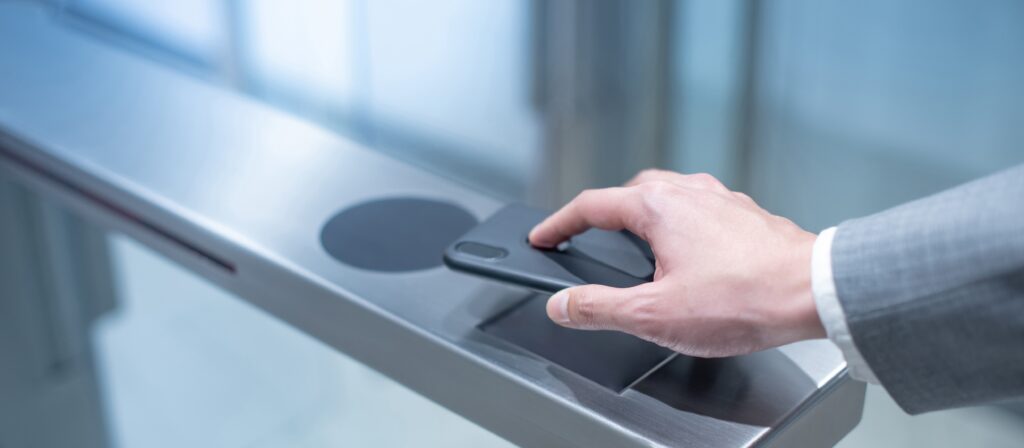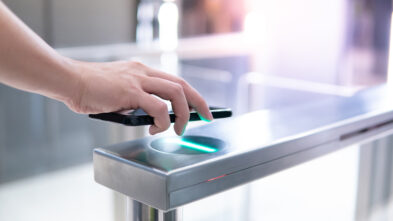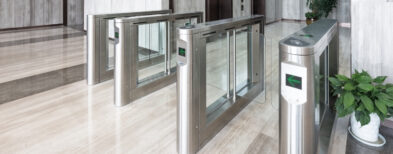Mobile access control is one of the most convenient and cost-effective types of security available. These systems allow IT and security teams to replace physical keys, such as key cards and key fobs, with digital access badges accessible on a smartphone or mobile device. As a result, the overall process of provisioning credentials has become easier, faster and more secure than ever before.
In this article, we’ll discuss how mobile access control systems work and why they are transforming security operations.
What is Mobile Access Control?
Mobile access control is a way to secure a building, office or other facility using smartphones, smartwatches and tablets as entry credentials. These systems work in much the same way as their key card predecessors.
- A system administrator assigns permissions to an end user and programs the permission into a credential.
- The credential is distributed to the end user.
- The end user accesses specified areas by showing their credential to the door reader.
It’s that simple.
How do Mobile Credentials Work: Two Popular Methods
The main difference between key cards and mobile badges is how they interact with the door reader. Mobile systems send and receive credential information wirelessly. The technology transmitting the signal typically comes in one of two forms.
Bluetooth Low Energy (BLE)
Bluetooth technology establishes a personal-area network (PAN) between two devices that allows them to share information such as access credentials. Bluetooth-enabled mobile access allows security systems to pair with smartphones. When a smartphone comes into contact with a door reader, electronic signals containing the credential information are transmitted between the devices. The reader passes the information to the door controller, which in turn verifies the credential information. If the information is correct, then access is granted.
Near Field Communication (NFC)
Near field communication (NFC) is another technology used in mobile access control. You might be familiar with NFC as it’s used in contactless debit and credit cards and at ATMs.
When it comes to access control, NFC offers a convenient and frictionless option for touchless entry. This is an especially advantageous method in the era of COVID-19, where minimal to no contact is essential to workplace health.
NFC is the premier choice for a contactless exchange or transmission of data (in this case, credentials) between two devices. Like Bluetooth, NFC works on the principle of sending information through RFID (radio frequency) waves. Unlike Bluetooth, however, NFC is limited to small ranges or shorter distances of communication. For a detailed breakdown and analysis of NFC vs. Bluetooth, check out our whitepaper.
Why are Mobile Security Systems Becoming More Popular?
In 2022, more than 24% of companies surveyed by IFSEC Global said they had switched to mobile credentialing. Another 42% stated that they had plans to switch.
There are several reasons why mobile security is increasing in popularity. The benefits of mobile credentials include:
1. Increased Efficiency
2. Better Safety
3. Added Convenience
4. Cost-effectiveness
Let’s take a more detailed look at each of these advantages.
1. Increased Efficiency
Mobile security helps teams increase their overall efficiency, saving them time and money. One of the areas it helps with the most is the provisioning process.
Instead of having to physically distribute proximity cards or key cards, system admins can send mobile credentials to end users electronically. Not only does this make provisioning new users quicker, but it also makes deactivating credentials seamless.
Read our case study to see how Shopify is using Genea Security to help implement a mobile-first workplace.
2. Better Safety
Another benefit of mobile access control is its ability to bolster physical security and employee safety. Many people already carry smartphones. By storing mobile credentials directly on smartphones, organizations eliminate the need to keep track of a key card. To this end, mobile access control reduces the potential of lost, stolen or cloned key cards.
Additional security benefits of mobile access control systems include:
- MFA (multi-factor authentication): MFA gives you the ability to use multiple authentication steps for entry to sensitive areas. For example, you can combine Bluetooth mobile credentials with text message verification. Those in need of even higher security can combine mobile and biometric access control.
- Audit logs and customizable reports: Many mobile access control systems include the software to logs access events. This software records the person, time and location of each access event. In the case of an audit or emergency, you can easily pull up and reference the log.
3. Added convenience for all
As mentioned, mobile credentials offer unparalleled convenience for end users and IT and security teams. Here’s how:
- For end users, mobile credentials completely eliminate the need for physical keys, smart cards, or key fobs. As a result, it means users no longer need to search for their keys when trying to access a building. Further, and more importantly, mobile access can work offline and doesn’t require a downloaded mobile app to work.
As a bonus, some advanced mobile access systems are even
Smartwatch and wallet compatible. Genea Security, for example, integrates with Apple Wallet, allowing users to store their employee badge with other digital items like driver’s licenses and credit cards.
- For security teams and system administrators, mobile access credentials and permissions can be easily updated in real-time, greatly reducing the work required when entry systems need to be updated manually. Mobile access systems and credential management can also be conducted on the cloud, allowing administrators to manage mobile access remotely.
4. Cost-effective solution
Because mobile credentials are easily updated, mobile credentials reduce labor- and cost-intensive door and lock system overhauls in the event of lost access cards. When a physical key is lost, it may require building teams to effectively “lock down” an entire building for risk mitigation.
This can result in unnecessary downtime, the loss of productivity, and a general inconvenience to all those affected. Further, mobile credentials eliminate the need to procure physical credentials, such as keys and badges. These features can save you significant costs in the long run.
Learn more about the cost of mobile security systems and ways you can save.
Mobile Access with Genea
Because mobile access credentials can benefit nearly every facet of your operation, they are quickly becoming adopted as preferred access credentials in the security industry. Mobile credentials offer the most convenient and cost-effective means for regulating access control in your building. Even better, mobile access control can be easily integrated with other parts of your tech stack into a single pane of glass solution.
Genea offers a robust access control platform that utilizes the most up-to-date technologies, including mobile credentials. With our cloud-based access control system, you can manage keyholders, monitor activity and create audit reports with the simple push of a button. Plus, it’s all built on open, non-proprietary hardware, so you’ll never be locked into a single vendor.
Learn how Genea’s mobile access control solutions can help secure your operation and keep your tenants happy.



